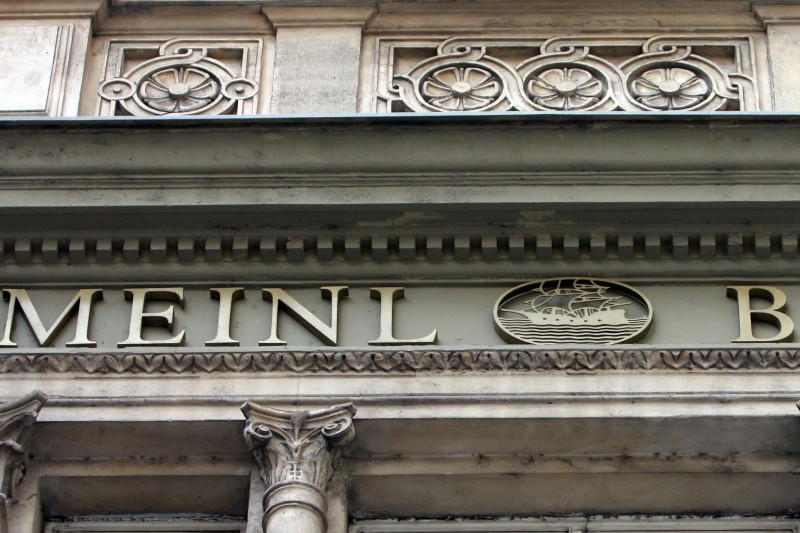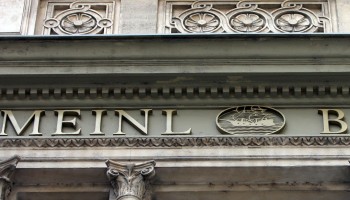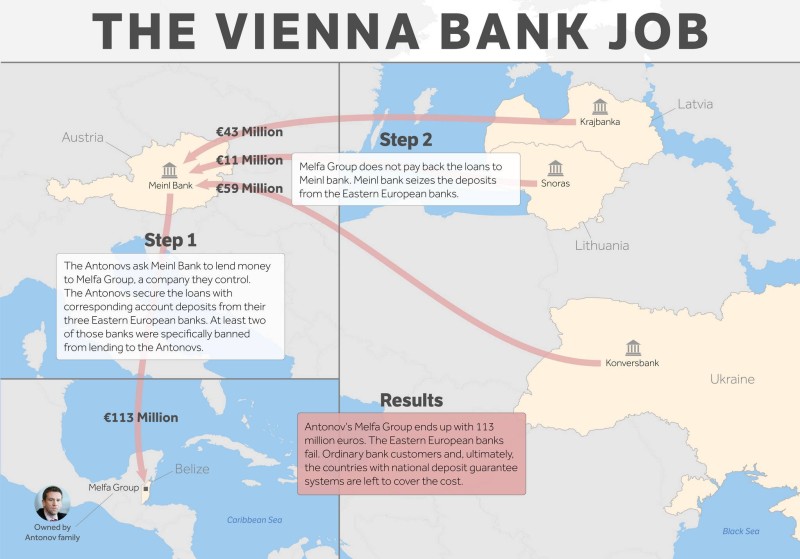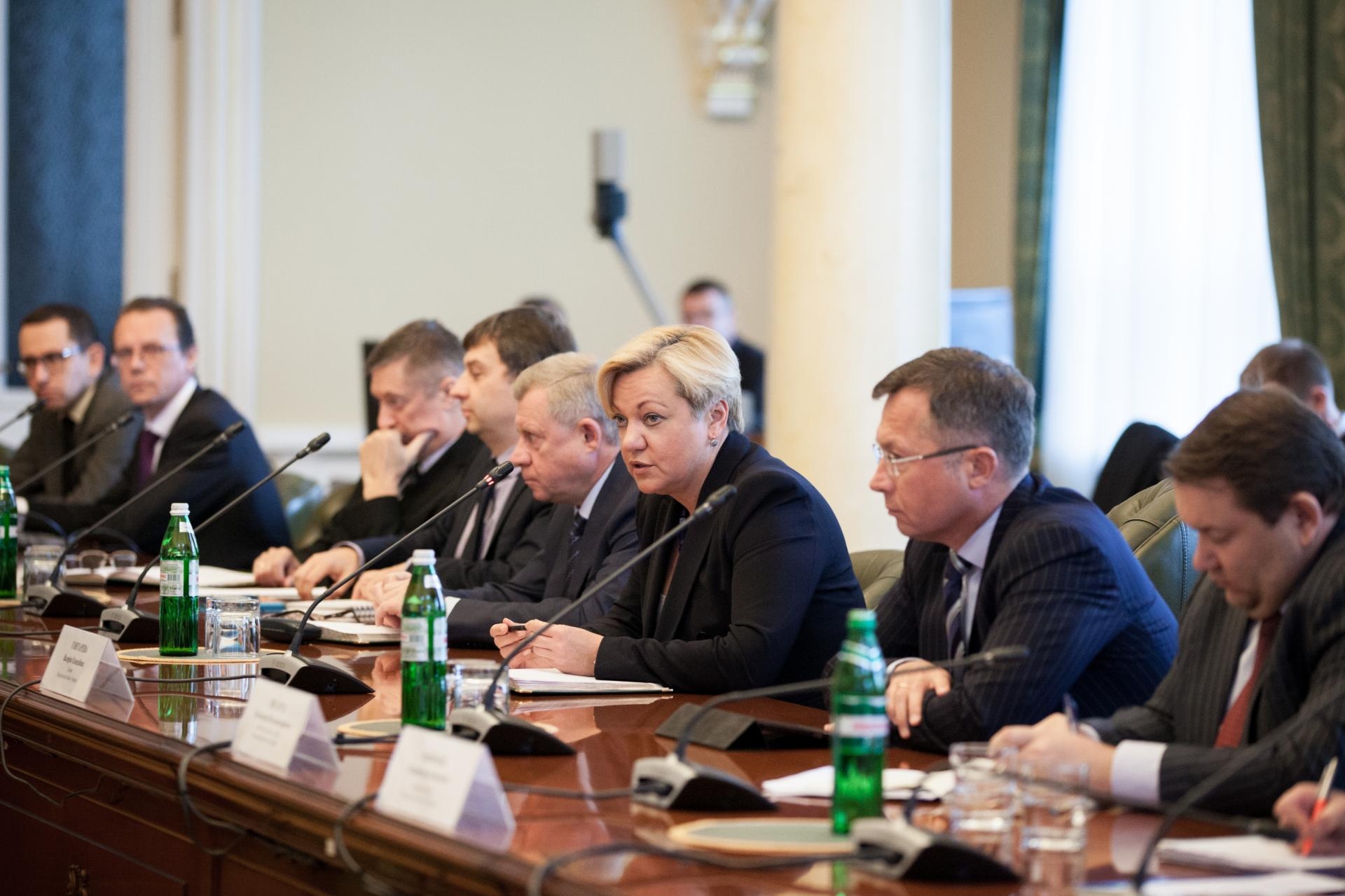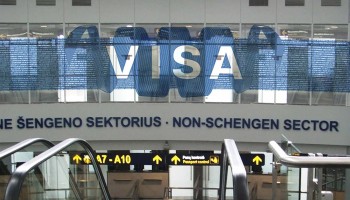For years, banks in three Eastern European countries were stripped of assets by their owners using a blunt but efficient scheme made possible by Meinl Bank, a venerable Austrian financial institution that lost its license last week.
Hundreds of millions of euros were siphoned out of Ukraine, Latvia and Lithuania, punching holes in state budgets and leaving creditors empty handed, according to a six-month investigation by OCCRP and its Austrian partners, profil and ORF.
At the heart of the scheme was Meinl, which had gambled big — and lost — in real estate before turning to a profitable new business: helping bankers across Eastern Europe siphon money from their own institutions. The business helped keep Meinl afloat but the bank, now called Anglo Austrian AAB Bank AG, may pay the ultimate price.
THE VIENNA BANK JOB
When it came to stripping assets from their financial institutions, Eastern European bankers found the infrastructure they needed in a century-old Austrian bank.
On November 15, the European Central Bank (ECB) revoked the private Viennese bank’s license.
“The license of Meinl was revoked due to its history and the violation of due diligence over the past few years,” Helmut Ettl, executive director of the Austrian Financial Market Authority, said Friday.
In a statement to OCCRP, the bank said it regrets the revocation decision, which it called unnecessary.
“(T)oday's decision by the ECB does not change anything; the bank will continue and complete its withdrawal from the banking business as planned,” the bank said, adding that unspecified “legal steps are currently being evaluated.”
Authorities in four countries have confirmed criminal investigations of operations facilitated by Meinl Bank between 2011 and 2015, when hundreds of millions of dollars and euros from other banks flowed through Meinl accounts before disappearing into shadowy offshore companies.
The investigation by OCCRP and its partners found evidence that Meinl helped bankers in Ukraine, Lithuania and Latvia bypass regulations and bans, shifting vast amounts of money out of their banks just before their collapse.
“If you know that your customer is a fake company, shell company, that siphons money abroad… and they knew that. … Meinl Bank knew and never informed no one about these schemes,’’ Valeria Gontareva, former head of Ukraine’s central bank, said in a recent interview. In a statement last week, the bank dismissed Gontareva’s allegations.
“According to our information, Mrs. Gontareva can no longer enter Ukraine, her apartment was searched by law enforcement in September and she is currently suspected of having laundered money on a large scale for both ex-president Yanukovich and ex-president Poroshenko,’’ the bank said. “It is strange … to use such a person with a bad reputation as evidence for an alleged misconduct of (Anglo Austrian Bank).”
Gontareva on Monday said she sees no reason to react to the Austrian bank's accusations. “Who is Meinl Bank to accuse me?" she said, then called the bank’s comments about her "a stupid joke.”
BACK-TO-BACK
The Vienna bank job employed a form of international financing called back-to-back loans, through correspondent accounts other banks set up at Meinl. Such accounts are mainly used to facilitate international trade and make payments in different currencies fast and simple. But at Meinl, some accounts were allegedly set up to benefit the banks’ owners.
Typically, banks in places like Ukraine would guarantee a Meinl loan to an offshore company with opaque ownership or a direct tie to the banks’ owners. The “borrower” would then default, prompting Meinl to invoke the guarantee and recoup the money from the originating bank.
Left to pay the bill were ordinary bank customers and, ultimately, states with national deposit guarantee systems. Ukraine, where some 100 banks were placed under state supervision and closed in 2014 and 2015 due to questionable accounting practices and suspected money laundering, was hit particularly hard.
The Ukrainian Deposit Guarantee Fund (DGF) estimates that 14 banks used corresponding accounts at Meinl to move US$385.6 million and 75.7 million euros that disappeared during the Ukrainian financial crisis.
Banks in Lithuania and Latvia, meanwhile, lost some 54 million euros that went offshore via Meinl Bank.
While Ukrainian banks lost more money, the Baltic banks present the clearest record of how the Vienna bank job worked.
THE GETAWAY
On December 16, 2011, Russian banker Vladimir Antonov entered London’s Westminster Magistrates Court to fight extradition to Lithuania, where he was accused of stripping his own bank of assets. A few weeks earlier, Meinl Bank had helped Antonov take some 11 million euros from Snoras Bank through back-to-back loans to his Belize shell company, Melfa Group, after the Bank of Lithuania banned all loans to Antonov or his businesses.
Documents show Meinl also helped Antonov pump assets to Melfa from two other banks he owned: Krajbanka in Latvia and Konversbank (later City Commerce Bank) in Ukraine.
Using Meinl, Antonov shifted some 113 million euros to his offshore company, according to documents obtained by profil and OCCRP.
Antonov was known for his passion for fast cars, which included hyper-expensive Spyker sports cars owned through his bank and investment in the Dutch sports car manufacturer. His Snoras bank made a surprise appearance in Formula-1 racing as a Renault F1 team sponsor in 2010.
But race fans didn’t know that Antonov’s banking empire was running on fumes. Both Snoras and Latvijas Krajbanka would fail by the end of 2011.
Prior to 2011, Snoras enjoyed a cozy relationship with Lithuanian regulators. The daughter of Kazimieras Ramonas, the central bank’s head of supervision, was a Snoras employee. Moreover, Ramonas attended the wedding of the son of Antonov’s Lithuanian partner. Ramonas was sacked shortly after Snoras collapsed and was convicted of abuse of office, though he won acquittal on appeal last year.
But even under Ramonas’ watch, the central bank was tightening its grip on Snoras. “The Bank of Lithuania has imposed sanctions on Snoras bank as early as January 2011, banning the bank from issuing loans to its principal shareholders and companies under their control, since Snoras failed to properly assess the credit risk it was undertaking,” Vytautas Valvonis, former director of the Supervision Service of the Bank of Lithuania, told OCCRP in August.
Snoras’ subsidiary, Latvijas Krajbanka, had similar lending limits.
“There was a ban in power, issued by the Financial and Capital Market Commission. It was forbidden to issue any loans to non-resident companies (such as Antonov’s Melfa Group),” Latvian prosecutor Igors Gerasimins told OCCRP.
So Antonov turned to Meinl to help wring money from his failing banks, according to documents obtained by profil.
A SIMPLE PLAN
In July 2011, Alexander Antonov, Vladimir’s father and a Snoras supervisory board member, visited Vienna to meet Meinl deputy chairman Peter Weinzierl and Jacob Mitbreit, a representative of Meinl’s Russian desk.
According to an Austrian court ruling obtained by profil, Alexander Antonov “indicated his interest in (a) trust loan transaction where Meinl would serve as trustee” with “banks owned or controlled by the Antonov family” responsible for repaying the debt.
Vladimir Antonov and Martins Zalans, a Latvijas Krajbanka board member, made their own trek to Meinl a month later. The bankers agreed to set up the trust loan mechanism that Antonov used to shift assets from his Eastern European banks.
The plan, as later described by banking regulators and by Meinl Bank itself, was simple: Meinl would make loans to Antonov’s Melfa Group that would be secured by deposits from Antonov’s banks – 11 million euros from Snoras; 43 million from Krajbanka. Antonov’s Konversbank also kicked in 59.3 million euros.
In Lithuania and Latvia, they were working against the clock. Just weeks after the Meinl loan money reached Melfa in the fall of 2011, Lithuania nationalized Snoras. Krajbanka collapsed soon after.
Bankruptcy administration was imposed on both banks, but it was too late.
Because Melfa Group failed to repay its loans, Meinl eventually took the 54 million euros deposited by Snoras and Krajbanka.
When Konversbank collapsed in November 2014 the game was repeated. Meinl Bank withdrew 59.3 million euros from a correspondent account, citing a breach of contractual obligations by Melfa Group.
The Snoras liquidator sued Meinl in Lithuania, seeking repayment of 11 million euros. Meinl Bank brought the case before the Vienna International Arbitral Centre (VIAC) of the Chamber of Commerce of Austria — and suffered a crushing defeat in January.
The Arbitral Centre called transactions involving Meinl Bank "dubious" and "immoral," and declared contracts between Meinl and the Melfa Group null and void.
OLD HABITS
“The bank's principal shareholders created and enacted schemes which helped bypass these sanctions (against loans to Antonov) and lend the bank's funds to the companies under their control,’’ said Lithuania’s Valvonis. “Obviously, the bank and its shareholders did not notify the Bank of Lithuania about such illegal operations, including the operations with Meinl (Bank) and Melfa Group.”
Latvian authorities said the money movement cost Krajbanka 90 million euros alone, with Meinl helping shift nearly half to Melfa Group through two loans totalling 43 million euros. The remainder moved through other channels.
“I can confirm that these transactions are included in the criminal case (against Antonov).” Gerasimins, the Latvian prosecutor, told OCCRP.
Lithuania accuses Antonov of looting on a much bigger scale — some 500 million euros from Snoras. That criminal case was handed to the court in January, but Antonov has yet to face charges there.
The banker lost the extradition case in London, but he and his Lithuanian partner, Raimondas Baranauskas, then fled to Russia. Lithuania’s subsequent extradition efforts have been fruitless.
While beyond the reach of Lithuanian authorities, Antonov is not entirely in the clear. He’s now serving a 30-month prison term in Russia, where he pleaded guilty in March to a similar loan scheme that diverted money from St. Petersburg-based Sovetsky Bank to a front company.
Igor Reshetnikov, his lawyer in the Sovetsky case, told OCCRP it is impossible to reach Antonov in prison for comment.
Martins Zalans, the former Krajbanka board member who accompanied Antonov to meet Meinl executives, did not respond to a request for comment.
THE BAD AND THE UGLY
profil in 2015 reported that Meinl Bank generated nearly 20 percent of its total operating profit from back-to-back transactions between 2011 and 2014.
The transactions continued until 2015, when the Ukrainian Central Bank stopped them and the Austrian Financial Market Authority (FMA), acting on information from Ukraine, ordered an audit of Meinl’s books.
Ukrainian authorities say Antonov’s Konversbank was looted through a scheme nearly identical to that used on Snoras and Krajbanka.
According to a 2018 court order, Melfa Group in 2011 received several loans from Meinl that were secured by Konversbank. Antonov sold the bank to private investors the same year, days after the Snoras collapse. Konversbank stayed afloat for three more years and went under administration late in 2014.
After Konversbank's collapse, Melfa Group failed to repay Meinl Bank, which moved to take 59.3 million euros from Konversbank's correspondent account in December 2015.
Valeria Gontareva was the head of Ukraine’s central bank at the time. She said back-to-back schemes were common and foreign banks were used to siphon money from the Ukrainian banking system, but Meinl Bank was “a leader for this kind of transaction.”
“My daily routine was to check correspondent accounts of Ukrainian banks,’’ she said in an interview in London, where she now works.
“Immediately, I recognized 50 percent of Ukrainian banking system is just absolutely fictitious and artificial,’’ she said, “and the proof of that was total correspondent accounts of Ukrainian banks with absolutely strange banks, and among these absolutely strange banks was Meinl Bank.”
Some transactions were designed to fool regulators, she said.
Using correspondent accounts, money would be sent to shell companies, then returned to the bank to make the institution look more financially sound.
But some money left the banks and never returned.
Gontareva said she approached Austrian regulators several times, trying to get them to do something about Meinl.
Anglo Austrian Bank officials declined to disclose details of any transactions, citing Austrian bank secrecy laws. They also denied any wrongdoing, blaming action by regulators on an unspecified political conspiracy.
"The events took place several years ago and have little to do with the business model that the bank operates today," the bank said in a statement. "This type of business was conducted by numerous Austrian banks, sometimes with significantly higher amounts... the FMA had been informed in detail for years. AAB Bank AG discontinued such transactions years ago."
Asked about ongoing criminal investigations in Vienna, the bank said it received confirmation from Ukrainian authorities that "no investigations are being conducted against AAB Bank AG or its (current or former) employees or bodies. For unknown reasons, the (Austrian) central public prosecutor’s office for combating economic crime and corruption is conducting proceedings against some persons, some of them from Ukraine against whom Ukraine itself does not conduct proceedings."
Austrian Financial Market Authority spokesman Klaus Grubelnik said his agency diligently pursued Gontareva’s allegations.
"It goes without saying that the FMA immediately investigated any indications of violations of anti-money laundering regulations and consistently pursued violations,’’ Grubelnik said. “In 2015, we immediately surveyed which Austrian banks offer back-to-back transactions and what the volume was. We focused our audit on back-to-back transactions and checked compliance with the due diligence requirements for the prevention of money laundering; at one bank (believed to be a reference to Meinl) even the entire back-to-back portfolio was examined.
"We have imposed the highest fines in the history of the FMA to enforce the due diligence obligations for the prevention of money laundering, we have forced managing directors to resign or removed them, we also do not shy away from the ultima ratio (last resort) of taking the bank off the market."
More than seven years after Snoras’ collapse, Lithuanian law enforcement has finished an investigation into the alleged embezzlement. In January, investigators forwarded their case to the courts -- with little hope of seeing the former banker appear for hearings.
In Lithuania, Antonov and Baranauskas are accused of looting some 500 million euros. Melfa Group and Meinl Bank are a part of the criminal case, Lithuania’s Prosecutor General’s Office confirmed to OCCRP. Similar criminal proceedings related to transactions facilitated by Meinl Bank are ongoing in Ukraine and Latvia.
In the meantime, the countries that hosted the runaway banker’s businesses are left to cope with the ruins of Antonov’s fallen empire.
Gintaras Adomonis, head of Snoras’ administration, estimates the bank still owes Lithuania some 400 million euros. Antonov and his associates are also accused of looting 90 million euros from Krajbanka. Covering the losses of depositors who had accounts in banks that were milked with the help of Meinl and other Western banks has cost Ukraine hundreds of millions of euros.
Fiery Days in Kyiv
When OCCRP and profil interviewed Valeria Gontareva in London in July, the former head of Ukraine’s central bank said she does not need “new enemies.”
WHERE’S MEINL BANK?
All of a sudden, the name was gone.
On June 17, the Commercial Register of the Commercial Court of Vienna received a request from Meinl Bank AG to change the company’s name to Anglo Austrian AAB Bank AG. Nine days later, the name Meinl Bank disappeared from the register.
Shortly after that, on July 9, the Commercial Court received notice from Anglo Austrian Bank that the heir to the Meinl banking dynasty, Julius Meinl V, 60, had resigned as chairman of the bank’s supervisory board.
Meinl, the great-grandson of the bank’s founder, had reigned as head of the bank for 25 years before being named chair of the Supervisory Board in December 2007. No reason for the resignation was given.
In news releases in June and August, Anglo Austrian Bank announced radical changes in its business model, including cutting back on business in the post-Soviet Commonwealth of Independent States and complete withdrawal from the lending business everywhere.
The bank said it would instead “focus on the advisory business and investment banking.”
Gone, too, was the classic Meinl blue in the corporate design, giving way to coffee-brown tones. It was a radical turning point for the institution Julius Meinl II founded in 1923 as the “Spar- und Kreditverein der Freunde & Angestellten der Julius Meinl AG.”
No Meinl family member has replaced Julius Meinl V at the board level, even though the bank remains under the family’s influence. Most of its shares are held by the Dutch special purpose vehicle "Far East," which in turn is backed by several foundations whose beneficiaries are believed to be family members.
Julius Meinl V remains active in the family coffee and real estate businesses. His empire includes the exclusive Viennese restaurant "Meinl am Graben," which features a gourmet supermarket. He now lives mainly in the Czech Republic, according to Austrian media reports.
A STUMBLE AND NEW DIRECTION
The bank’s new business model was a way of coming to terms with a history tainted by a colossal business error known as Meinl European Land, or MEL.
MEL, listed on the Vienna Stock Exchange in 2002, was initially a gold mine for Meinl Bank. Though the bank did not hold shares in the Jersey-based real estate company, MEL paid it commissions and fees for management services; for administration of capital increases; for “market making;” and for the use of the Meinl name.
Profil has reported that between 2003 and 2008 Meinl netted about 300 million euros from MEL — more than two thirds of its earnings in that era.
But when the worldwide economic downturn hit in 2007 and 2008, MEL’s share price collapsed along with the value of its properties. Thousands of investors who lost money sued Meinl Bank, which had promoted MEL share certificates as a safe haven, “suitable for investing gilt-edged money.”
The bank has said it paid out more than 100 million euros over 12 years to compensate 12,500 investors. Meanwhile, criminal investigations related to MEL involving Julius Meinl V, former bank director Peter Weinzierl and others drag on.
After the termination of its business relationship with MEL in 2008, Meinl Bank needed new sources of income. It apparently found them in the back-to-back loan business.
The bank already had a Russian Desk, a department that serviced wealthy clients primarily from Russia and Ukraine. Meinl Bank had operated in Central and Eastern Europe since the 1990s, but this business gained momentum after the MEL debacle.
Weinzierl, a member of the Executive Board since 1999 and a close confidant of Julius Meinl V, had good contacts in Russia, though one of his employees, Matvei Hutman, probably had better ones.
Hutman had worked for the Meinl Group as a coffee distributor in the Russian market in the early 2000s.
In 2010, Hutman left the coffee business for the Russian Desk, where he acted with apparent success as client adviser and "door opener."
Hutman later became manager of Meinl's Asset Management and Private Banking division, where he was mainly responsible for the acquisition of Ukrainian clients such as Delta Bank, which was owned by Ukrainian oligarch Mykola Lagun.
In 2015, Kyiv-based Delta bank went bankrupt. Ukraine’s state deposit insurance fund, DGF, later had to shell out about $575 million to compensate 590,000 Delta customers.
Regulators determined that in the run-up to the bankruptcy about $87 million in Delta Bank assets had been channeled through Meinl Bank to Silisten Trading Ltd., a shell company registered in the British Virgin Islands.
UNRAVELING UKRAINE’S BANKS
In 2014, when Ukraine’s banking sector collapsed, Ukrainian banks had about $2 billion in deposits in “strange” foreign banks, as Gontareva called them.
“Meinl was a leader for these kind of transactions ...maybe $1 billion, maybe less,“ Gontareva said.
Regulators told the banks they had until April 1, 2016 to repatriate funds and sever ties with the foreign banks.
Gontareva also said she tried to get Austrian banking regulators to act.
“Unfortunately our colleagues from Austria didn’t do their homework,’’ she said. “My first meeting with the governor of the Austrian central bank Mr. (Ewald) Nowotny was maybe in October 2014, at the IMF general annual meeting. …The first warning was ‘Please, your bank is a facilitator of all money laundering in Ukraine.”
Nowotny told profil in July that "Mrs. Gontareva informed me at the time. It wasn't very detailed, it was just ‘Meinl Bank is involved in money laundering.’"
Nowotny said he took the warning seriously and informed his staff and the FMA.
The FMA did take action in December 2014, commissioning the audit firm PwC to examine all Meinl Bank back-to-back fiduciary transactions then active. PwC was to determine if Meinl had complied with due diligence to combat money laundering and terrorism financing.
Internal documents related to an inspection of Meinl’s operations obtained by profil suggest numerous irregularities at the bank, including failure to comply with anti-money laundering rules and disregard of numerous red flags related to its foreign clients.
Austrian prosecutors began their investigation in late 2015. Charges were initially directed against Weinzierl and other former bank managers but the investigation is ongoing and has grown to include a number of suspects, most of them Ukrainian. A prosecutor’s office representative confirmed the authority is conducting proceedings on suspicion of money laundering against about 30 named persons.
In September 2016, the FMA imposed an 867,000 euro fine on Meinl Bank for repeated violation of rules designed to prevent money laundering and terrorism financing. The fine was later reduced to 500,000 euros.
Inga Springe from partner center Re:Baltica contributed and OCCRP interns Anne Todd, Ivana Saric, Maya Perry, Kornelija Ukolovaite and Samuel Trilling contributed to this report.
